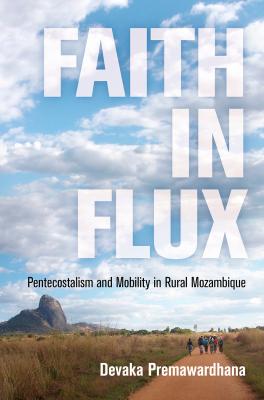Faith in Flux. Devaka Premawardhana
Читать онлайн.| Название | Faith in Flux |
|---|---|
| Автор произведения | Devaka Premawardhana |
| Жанр | Биология |
| Серия | Contemporary Ethnography |
| Издательство | Биология |
| Год выпуска | 0 |
| isbn | 9780812294842 |
A suspicion toward acquisition and an embrace of mobility were widespread among those I came to know in Maúa’s outlying villages. In defiance of their critics in town, they viewed their transience as a reasonable adaptation to a land predictable only in its unpredictability. Historian Malyn Newitt describes an early nineteenth-century period of persistent instability, known as the great Mozambique drought, as possibly the severest rain shortage on record. It was far from the only one. Some years of drought are expected to punctuate every person’s lifespan. As recently as 2003, rains failed to fall in Maúa, forcing kin groups to activate coping strategies honed over centuries: first intensifying hunting and trading, then searching out and moving communally to more fertile regions (Newitt 1995: 253–54).
On a smaller scale, the same mobility transpires, even when the vagaries of drought and famine do not threaten. The Makhuwa of rural Niassa practice what is known as shifting cultivation. Rather than rotating crops within a single field, farmers rotate fields, relocating to a new area every year to preserve soil fecundity. One village elder spontaneously offered this as his example when I asked about the word othama (to move): “Othama is very important,” he said. “The population stays in one place for a time and the land becomes tired. It goes to a new site, and later thinks of returning because the land recovered.” This rotational method is sometimes called “slash and burn,” though this term may be less than helpful due to its disparaging connotation when used by people presuming to speak for modern scientific efficiency (see Cairns 2007). For others, interested less in dominating the land than in caring for it, and receiving its care in return, shifting agriculture has proven effective in adapting to the uncertainties of the physical climate. It is likewise a time-honored response to uncertain political climates (Scott 2009: 178–219). It facilitates flight in case of such unwelcome intrusions as enslavement and war (explored in Chapter 1) or taxation and conscription (to be explored here). Given these advantages, it is perhaps unsurprising that the Makhuwa language has developed entirely different words to distinguish an abandoned crop field (mathala) from a new one (mathatu): an illustration of the many possibilities for talking about, akin to the many possibilities for bringing about, new beginnings in new locations.
The State Against the Peasantry
The characteristic mobility of the Makhuwa runs diametrically counter to the administrative logic of their would-be rulers. Managing a population requires first locating it in place, making it accountable by rendering it legible. Nomadic, fugitive, and maroon communities have therefore always posed a challenge to the state in its function as an “apparatus of capture” (Deleuze and Guattari 1987: 424–73). In her historical ethnography based in southern Mozambique, Merle Bowen (2000) refers to this in conflictual terms, as “the state against the peasantry.” Bowen’s is one of numerous Mozambican studies to chronicle the failure of state-engineered “development” policies to grasp the complexities of local conditions, let alone to promote economic growth. This conflict between state and peasantry is ultimately a conflict between two ways of being-in-the-world: fixity and containment versus mobility and the refusal to be contained (see Bertelsen 2016). Here I trace this particular dimension of the conflict across three major periods of Mozambique’s recent past: the colonial, the postcolonial/socialist, and the postsocialist (during which my fieldwork took place).
Конец ознакомительного фрагмента.
Текст предоставлен ООО «ЛитРес».
Прочитайте эту книгу целиком, купив полную легальную версию на ЛитРес.
Безопасно оплатить книгу можно банковской картой Visa, MasterCard, Maestro, со счета мобильного телефона, с платежного терминала, в салоне МТС или Связной, через PayPal, WebMoney, Яндекс.Деньги, QIWI Кошелек, бонусными картами или другим удобным Вам способом.
